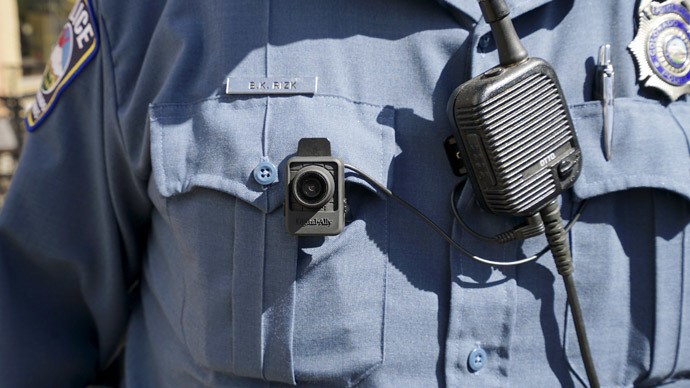DoJ announces $20 million body camera program for police

The Department of Justice has unveiled a program that will equip police officers with nearly $20 million worth of body cameras among as many as 50 law enforcement agencies across the United States.
The Body-Worn Camera (BWC) Pilot Partnership Program announced on Friday puts aside $17 million in competitive grants to go towards body cams, as well as $2 million for training and assistance and $1 million to help evaluate the technology.
“This body-worn camera pilot program is a vital part of the
Justice Department’s comprehensive efforts to equip law
enforcement agencies throughout the country with the tools,
support and training they need to tackle the 21st century
challenges we face,” Attorney General Loretta Lynch said in
a statement. “Body-worn cameras hold tremendous promise for
enhancing transparency, promoting accountability, and advancing
public safety for law enforcement officers and the communities
they serve.”
The Justice Department expects to give out 50 awards through the
new program to various law enforcement agencies, but the
contracts will require the winning departments to match the
contributions with their own funds.
Justice Department Announces $20 Million in Funding to Support Body-Worn Camera Pilot Program http://t.co/hShkXUDmAI
— Justice Department (@TheJusticeDept) May 1, 2015
One-third of the grants given out under the BWC program will be
allocated to smaller agencies, the DoJ said, and the $17 million
will be part of a broader effort announced by US President Barack
Obama in December to invest $75 million towards acquiring 50,000
cameras over three years – itself part of an even larger White
House initiative to invest more than a quarter-billion on funding
and training law enforcement announced last year.
Costs for acquiring body cams and maintain infrastructure to
preserve digital evidence range depending on vendor, contract and
type of service, among other factors, but in many instances
cities have invested millions of dollars into such program. An
ongoing effort in San Diego, California is expected to set the
city back around $3.9 million over five years, according to a
recent Associated Press report, and a proposal weighed last year
in Baltimore, Maryland was cut after the mayor learned it would
have cost the city $2.6 million annually just for storage and
hiring extra staff.
“Knowing how we didn't have a lot of wiggle room with the budget
constraints we face, we couldn't afford to get it wrong,”
Baltimore Mayor Stephanie Rawlings-Blake said when she vetoed that plan in December
because she believed costs had not been adequately considered.
READ MORE: Body cameras reduce police
use-of-force, citizen complaints - study
In the last month, however, her city has been transformed into
the latest epicenter in America for an emerging debate on police
accountability. Freddie Gray, a 25-year-old black man, died in
mid-April from injuries sustained while in the custody of the
Baltimore Police Dept., and on Friday the six officers involved
were indicted on charges related to his death.
Along with the public outrage that erupted in the street of
Baltimore upon Gray’s arrest and subsequent death, video footage
of his apprehension has been considered instrumental in elevating
his case. Similarly, a police officer from North Carolina was
charged with murder only weeks earlier after an eyewitness caught
on cameras as he fired eight shots at a man, killing him.
Along with helping equip agencies with cameras, the program
announced this week will also provide departments with $2 million
worth of assistance and implement measures to make sense of the
data being collected by the devices. The Office of Justice
Programs’ Bureau of Justice Statistics will be given $1 million
collect data on the camera usage, the DoJ said, and “will
also design data collection forms that can be used in future
surveys of prosecutors and public defenders to measure how
body-worn camera footage is being used by the courts in criminal
cases.”
The DoJ says agencies interested in applying for a body camera
grant have until June 16 to do so.












